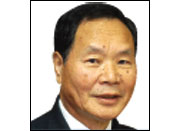2 crucial months before inauguration
The election of Park Geun-hye as the country’s first female president opens a new horizon of democratic development in Korea. She received an undisputable mandate to lead the nation for the next five years with 51.6 percent of the vote with 15,773,128 votes, whereas her opponent Moon Jae-in gained 48 percent with 14,693,632 votes.
However, there are many formidable challenges lying ahead for the Park administration that will be inaugurated on Feb. 25 next year. In American presidential politics, it is said that a new administration’s success often depends on what it does in its first 100 days. By contrast, it appears in Korea that the first 67 days from election to inauguration as president may determine the fate of a new administration.
Since the election President-elect Park Geun-hye has so far been doing just fine, saying the right things helpful to pulling together the divided voters, reaffirming her commitment to carry out her campaign promises including “a new era of new change and reform.” She understands that more than 14.6 million people plus 25 percent of the eligible electorate did not vote for her.
Her task begins with forming a transition team. Appointment of the head and 26 members of the Transition Committee will signal the direction of the incoming administration’s policy. The committee’s job is not just to find out what the outgoing administration has been doing and to take over the government but also to set the tone and goal for the new administration based on the President-elect’s vision and campaign promises. It should prioritize campaign pledges, and discard early those not possible to deliver.
She will also form her presidential staff including a chief of staff and the first Cabinet of her administration, including a prime minister. She needs the National Assembly’s support to confirm her Cabinet nominees, to pass some legislation to change the government structure, and to approve budget bills required to carry out her programs. All these will have to take place during the two months prior to her inauguration.
“I will appoint people proportionally, representing all regions, both genders and all generations,” Park said the day after the election. However, the public expects her appointments should also be made based on merit, not cronyism by way of loyalty or contribution to her successful election. This will be one of the hardest tasks. It is her prerogative to appoint whomever she wants for whatever position. She knows her predecessor failed in this first crucial process and never recovered from that.
The election was determined by the ideological, regional and generational divide rather than by a clear difference in campaign platforms between the competitors. Both candidates ran for economic democratization and increased state welfare, national unity transcending differing views, and regional differences, as well as a new political reform which surfaced as a strong demand of many voters who were fed up with the “old politics as usual.”
North Korea had a negligible influence across the board, except for the older voters. An exit poll showed 70 percent thought the economy was the most urgent issue, and only 5 percent said improvement of inter-Korean relations mattered. However, the North’s rocket launch and the controversy of the Northern Limit Line appeared to hurt the opposition candidate.
Park’s victory proved that the voters, especially those in their 50s and above, preferred a slower pace of change out of concern about questionable revenue to support plush campaign promises and uncertainties of the security situation that hinges on North Korean behavior. Demographics puts the older generation as the largest voting bloc, about 80 percent of which went to the polls and 72 percent voted for Park.
The opposition candidate’s defeat was due to multiple factors. Chief among them were Moon’s preoccupation with a unified candidacy with Ahn Cheol-soo, the negative view against the remnants of the Roh Moo-hyun faction, third party candidate Lee Jung-hi’s repugnant attack on Park during the first two TV debates, and the opposition party’s politicization of “economic democratization.”
The opposition Democratic United Party is in disarray yet to recover from the shock of defeat and with no leadership in place. Yet it has 127 seats of the 300 in the national parliament that allows a filibuster system to be overridden by 60 percent of the total. It remains to be seen whether the defeated party will be reborn as a re-invented, effective opposition party or a new one merging with the forces of Ahn supporters and progressive civic activists.
Whatever develops in the opposition parties, the newly elected president must work with them. The majority of Park’s supporters also hope for “new politics” and “national integration” through which the ruling and opposition parties cooperate on major issues of national interest by curtailing the privileges of politicians and the “imperial aspects” of presidential power.
On the foreign policy front, Park’s transition team is yet to produce the details on how President Park will deal with a de facto nuclear North Korea beyond the announced “trust process” by which her administration will cooperate with the North as trust is built between the two sides. Park will provide humanitarian assistance separate from the nuclear and security issues. She demands some kind of positive North Korean response to its torpedoing of the South’s warship the Cheonan before undertaking economic cooperation.
There is a consensus in the South that inter-Korean dialogue must reconvene as an approach to seek denuclearization and to secure peace on the peninsula. It will not be easy to pursue balanced diplomacy in the setting of cooperation and competition between China and the United States and a resurgence of Japan’s militarism from the return of the conservative Liberal Democratic Party. What’s your take?
The writer is a research professor at the Ilmin Institute of International Relations at Korea University and a visiting professor at the University of North Korean Studies. He is also an ICAS fellow. Reach him at tong.kim8@yahoo.com. <The Korea Times/Tong Kim>

























































